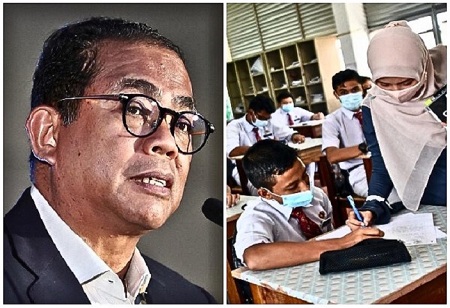Flexible studying is the key to tomorrow’s education system, said Higher Education Minister Datuk Seri Mohamed Khaled Nordin. He said the concept of one size fits all in higher education is no longer relevant to fulfill the needs of today's and the future’s students. He said in the conventional tertiary education scheme, there is always a conflict between wanting to keep a standardized system with certain quality and criteria as opposed to the concept of flexible learning.
“But the future of education requires us to be strong and quick enough to be able to withstand challenges ahead”, Khaled said. The synergy between flexibility and quality is important as flexibility allows us to adapt to the ever-changing dynamics of learning and education, he said. “That is why life-long learning and the future of education in Malaysia needs a more structured form of flexibility that allows us to increase our ability to face tomorrow’s education”, he said in his speech at the opening of the Malaysia Qualifying Agency International Conference 2023, here, Tuesday.
The two-day conference is attended by over 300 participants comprising quality assurance specialists, policymakers, academicians, higher learning institute quality assurance officials, as well as industry players from the United Kingdom, Germany, Kazakhstan, Uzbekistan, Kyrgyzstan, Hong Kong, Taiwan, China and Indonesia. Speaking more on flexible learning, Khaled said coordination from quality education structure and ‘transferable’ qualifications need to be created. For example, there should be different quality benchmarks for conventional studies, online learning, hybrid as well as macro-credentials and micro-credentials, he said.
“I see great potential in the development of micro-credential qualification that surpasses the upskilling and reskilling ecosystem benefit”, he said. “Apart from that, higher learning institutions in the country can work together with industries to come up with education products to increase the marketability of graduates and offer them to international students in time to come”, he added.
Khaled said there are extremely positive developments toward the demand for micro-credentials by local institutions and upskilling and reskilling programs that are promoted by the Government and industry players. The Malaysian Qualifications Agency (MQA) had also published some guidelines to support these matters towards achieving the MQA certification, he said.
Micro-credentials are able to support the sustainability of life-long learning, especially for the working people who need these types of flexible learning opportunities, he said. “This initiative can help the Government create more skilled workers and local talents, but of course, there is still much to be explored and fine-tuned for the flexible learning path in Malaysia”, said Khaled.
He said the Ministry is still looking at all policies and strategic cooperation opportunities to support the Government’s aspiration towards creating a prosperous and knowledgeable community. Also present were the Higher Education Ministry Deputy Chief Secretary (Management and Development) Datuk Dr Mohd Zabri Yusoff, Higher Education Director-General Prof Dr Azlinda Azman, and others.

